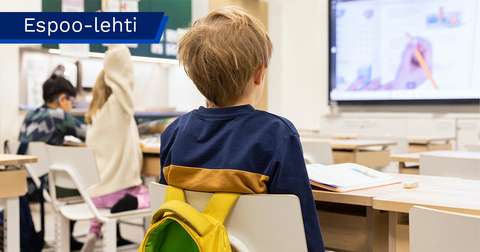Learning support to be provided in the pupil’s own classroom

As a result of a law reform, support for learning will become a flexible, integral part of everyday activities at schools. Children can attend their local school and stay in their own class, and parents will be spared unnecessary bureaucracy.
Every pupil is entitled to receive support for learning at their own school as soon as the need arises – without heavy administrative processes or specific diagnoses. This is the goal of the revamped learning support system in a nutshell.
The amended law entered into force at the beginning of August, and it concerns all schools in Finland. Tuomarilan koulu has already been developing its learning support activities in the direction required by the new law over the past few years.
“Our pupils are supported by a close network of teachers, including the class teacher, a special education teacher and a language and cultural group teacher. In addition, a teaching assistant is present in every lesson during the first and second grade,” Tuomarilan koulu’s principal Timo Turtiainen tells us.
The support for pupils is planned in teams in which the class teacher collaborates with other teachers. A child can get help in their own class without having to be separated from others.
“Support is provided where the child is and when the child needs it. The children get to attend their local school and belong to the group with other pupils,” Turtiainen says.
Even though pupils in special education classes are being increasingly integrated into mainstream education groups, special education classes will not be completely abolished. Schools can still set up separate groups for pupils with special needs if necessary.
Less bureaucracy, more support
In particular, the new model of support for learning features a new mindset towards support provision. The previous three-tier support system is being replaced by flexible teaching that takes into account the pupil’s needs in each situation and takes place in the pupil’s own class during the normal school day.
In the future, support for learning can be provided for an entire class, a smaller group or a single child – always according to the need and situation. For example, one teacher can teach a certain topic to a smaller group while another teacher works with the rest of the class. It is also possible to provide special needs education for a single pupil.
The new system accounts for the fact that pupils develop at an individual pace and, therefore, the need for support also varies, so it should not be tied to an official decision and carved in stone.
“In the past, both teachers and parents had to fill in a lot of different forms and documents, but now that work is omitted and instead, the time can be used to support the pupil,” says Mervi Salminen, Developer Teacher from Tiistilän koulu.
Responsibility for the practical implementation of the reform has been assigned to each school’s principal, which means that schools will have more authority in determining the ways of providing support.
“Providing support is the school community’s duty as required by the curriculum. The school must organise its activities so that it can guarantee every child the required support,” Salminen emphasises.
Support for instruction language development
Approximately 3,000 decisions on special and intensified support will be reviewed in Espoo over the next school year.
Even if the need for an official support decision is removed, the child’s right to receive help will not disappear. The support will just be organised more flexibly according to the situation.
“Particular attention will be paid to multilingual pupils and language support. If a pupil has challenges with the language of instruction, remedial instruction can be provided even outside the school day,” says Education Support Manager Miia Loisa-Turunen.
In Espoo, a continuum in the support for learning from pre-primary to basic education has been developed in close cooperation with early childhood education.
The law on the support system reform entered into force at the same time in basic and general upper secondary education. In vocational education, it will enter into force in August next year.
“When developing support, the entire educational path is taken into account. The goal is to ensure an uninterrupted continuum of support throughout the child’s schooling,” Loisa-Turunen says.
Read more about support for learning in pre-primary education: Timely support in a child’s own pre-primary education group
Read more about support for learning in upper secondary schools: Support for learning in general upper secondary school was reformed – support is available when needed
Text: Susanna Cygnel
This article was originally published in the Espoo-lehti magazine 2/2025. The magazine contains stories set in the school world